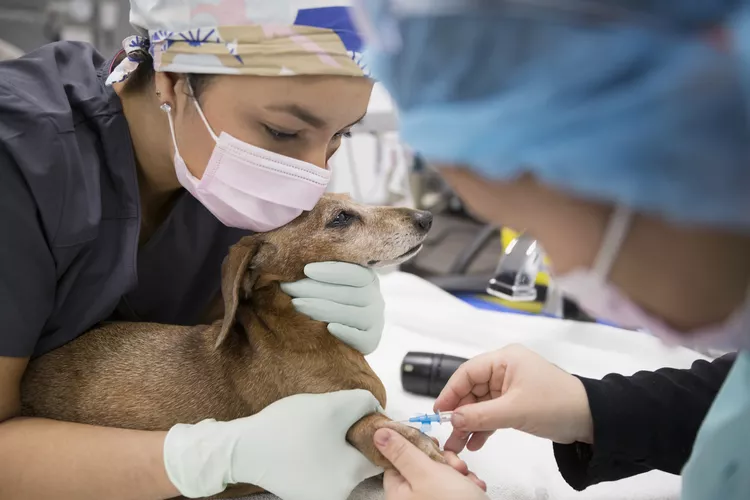
Ivermectin is commonly used in both dogs and cats for a variety of different diseases. It's prescribed to treat various types of parasitic infections, including both internal and external parasites. In addition, ivermectin is used in many commonly available heartworm prevention medicines, such as Heartgard Plus and others. Learn more about ivermectin for dogs and how to safely give it to your dog.
Ivermectin is a broad-spectrum antiparasitic drug used to kill a number of different parasites in dogs. It works by causing neurological damage to the parasite, which results in paralysis and death to the parasite. The most common uses of ivermectin in dogs include the following:
Always give ivermectin to your dog exactly as prescribed by your veterinarian. exact dosing will depend on the reason for treatment. When used as a heartworm preventive, your dog will need one oral dose per month. When prescribed to treat parasitic infections, your vet may dispense a liquid or tablet to be given daily by mouth for a period of weeks to months.
There are some dog breeds that are genetically sensitive to the medication. Their genetic mutation allows the ivermectin to pass through the dog's blood-brain barrier. It then enters the dog's central nervous system, which can be fatal to the animal. Before administering this to your dog, check with your veterinarian and make sure that your dog's breed can safely use ivermectin.
In dogs, the risk of side effects associated with ivermectin depends on the dosage, the susceptibility of the individual dog, and the presence of heartworm microfilaria (a larval form of the heartworm.)
When used at a low dose for heartworm prevention in a dog free of heartworms, ivermectin is relatively safe. At higher doses, which may be used to treat other parasitic infections, the risk of side effects increases. Potential side effects include:
When used in a dog infected with heartworms, a shock-like reaction believed to be caused by dying microfilaria can occur. This type of reaction may be accompanied by lethargy, a low body temperature, and vomiting. Dogs testing positive for heartworms should be observed closely for at least eight hours following the administration of ivermectin.
In many cases, the safety of ivermectin is directly related to the dosage administered. As with many drugs, higher dosages tend to have higher risks of complications and potential side effects associated. Ivermectin is used in many dosage ranges, depending on the purpose of its usage. Dosages used for preventing heartworm infections are generally relatively low, with little risk of side effects.
Higher dosages, such as those used to treat demodectic mange, sarcoptic mange, ear mites, and other parasitic infections, are more likely to be associated with adverse reactions. However, for most dogs, ivermectin is considered to be a relatively safe medication when used appropriately.
Neurotoxicity can also occur with ivermectin usage in some dogs. This is particularly common in dogs that have a genetic mutation known as the MDR1 (multiple drug resistance) gene mutation. This gene mutation is known to occur most commonly in breeds such as Collies, Australian shepherds, Shelties, Long-haired whippets, Old English sheepdogs, German shepherds, Silken Windhounds, Skye terriers, and other breeds with white feet. Symptoms of neurotoxicity include lack of coordination, muscle tremors, seizures, blindness, and death, thus giving rise to the motto "white feet, don't treat" with ivermectin.
Ivermectin used at dosages for heartworm prevention is generally safe for these dogs. However, the drug should not be used at higher doses for dogs that may possess the MDR1 gene mutation. There is a test that can be performed to check for this gene mutation. Ask your vet for more advice.
Ivermectin toxicity is very serious and it cannot be reversed. Speak to your vet right away if you believe your pet is suffering from an adverse reaction. They may recommend inducing vomiting or administering charcoal to minimize absorption of the drug.
In addition to its use in veterinary medicine, ivermectin is also used by doctors to treat a number of health issues in people. In humans, it is also useful in eliminating parasites. Ivermectin can be used to treat head lice, scabies, river blindness, and other conditions. It is only available with a prescription and is usually applied topically or taken orally. Keep in mind that no medication specifically labeled for animal use should be taken by humans. Presently, there is no reliable evidence to suggest the efficacy or safety of ivermectin against SARS-CoV-2, the virus that causes COVID-19, in humans.

How to Take a Car Trip With Your Cat
Think you can't travel with your cat? Think again! Traveling with your cat just takes a little preparation and planning. Here's how.
How to Determine Your Cat's Age
Determining the age of an adopted cat is just guesswork, but a vet can look at teeth, sexual maturity, fur coat, and eyes to estimate.
Cat Food Ingredients to Avoid
When checking the nutrition content of cat food, look for ingredients that are not healthy or show it is of poor quality. Avoid these 3 ingredients.
What You Need to Know About Homemade Cat Food
If you want to cook for your cat, make sure to read about the risks associated with homemade diets for cats
Can Dogs Eat Raw Chicken Feet?
What are the potential health benefits of chicken feet for dogs? What are the risks?
Macadamia Nuts and other Nuts That Are Toxic to Dogs
Find out why macadamia and other nuts are poisonous to dogs, what signs to look for, and what is needed to treat the toxicity.
10 Tips for Taking Care of a Senior Dog
Is your dog a senior? Changes to their diet, exercise, and care are required. Here's how to make sure they're living their best and healthiest life.
Hookworms in Dogs
Hookworms can make a dog uncomfortable but may also lead to serious blood loss and anemia. Learn the causes, treatment, and prevention.
Is Swiffer WetJet Safe to Use Around My Pet?
ASPCA toxicologists deemed Swiffer WetJet to be safe for use around pets, but there are other all-natural floor cleaning options available.
Can Dogs Eat Bread?
Is bread a safe snack for you dog? Are there kinds of bread you should avoid? Learn more about whether it's okay to feed your dog bread.
14 Hypoallergenic Cat Breeds for People With Allergies
There are no true hypoallergenic cat breeds. But some, such as the Siamese and Siberian, might be less likely to cause allergies than others.
Burmilla: Cat Breed Profile, Characteristics & Care
The playful and social burmilla is one of the newest cat breeds to be officially recognized by the CFA. Learn about burmilla breed.
Nebelung: Cat Breed Profile, Characteristics & Care
The Nebelung is a rare breed of domestic cat that’s known for their long gray-blue fur and gorgeous green eyes. Learn about the Nebelung cat breed.
Cymric: Cat Breed Profile, Characteristics & Care
The Cymric, a long-haired Manx, is one of the world's oldest cat breeds. This tailless cat is friendly and playful. Learn about the Cymric breed.
Here's Why Cats Groom Themselves
Learn all about cats' grooming habits: how and why cats groom, including mutual grooming, over-grooming, and displacement grooming!
Pharaoh Hound: Dog Breed Characteristics & Care
Learn all about the Pharaoh hound, a sight hound dog breed known for their slim appearance and the ability to blush when excited.
How to Walk Your Dog
Dog walks should be fun for your dog while respecting your community. Learn why walking your dog is important and get essential safety and training tips.
How to Stop Your Dog From Whining
Whining is a natural way for your dog to communicate with you. Explore the reasons dogs whine and how to discourage your dog from whining too much.
How to Stop Your Dog From Barking Excessively
All dogs bark, but excessive barking is a behavior problem. Learn how to help stop excessive barking and prevent it from happening all the time.
How to Train Your Dog to Live With Another Dog
When you add a second dog to your household, it's natural that there will be an adjustment period. Learn how to get two dogs to become acquainted.